I had given the same title to a post in November 2011! When listening to Pedro Bados, founder of Nexthink (an EPFL spin-off) on Radio Suisse Romande (you can listen to the podcast from time 6’50” (in French!), I needed to come back on the topic.
Let me give again Steve Blank’s definition which I had mentioned in the previous post: “startups are temporary organizations designed to search for a scalable and repeatable business model.” According Pedro Bados, “to be a start-up is more a mindset, focused on permanent innovation, than a question of size.” It is therefore a delicate definition and let me try to give general criteria.
A start-up is a corporation which explores, which is looking for a business model, a market, customers and is trying to innovate. It usually looks for a big market (“scalable”) and therefore service businesses do not qualify (except on the web) as they do not often scale. It is also a matter of strong and rapid growth in emerging markets because the competition is tough and there will be few winners. It often go fast. That is why it is more about a mindset: you are curious, in an uncertain world, trying to bring new things to the world.
Because you are looking for a business, you do not have enough paying customers, and you will most likely need external capital (business angels, venture capital) except if your future customers accept to pay a lot in advance. This is why there is a strong correlation between being a start-up and having investors.
Once you have found what you are looking for, you will need to put more processes in place, you will be less curious, maybe less innovative (at least you will not be 100% innovative anymore) and you stop being a start-up. In a recent post about a new book on Google, I mentioned that “Part II is about growth and it is a change from the chaotic experimental company Google was. Not a dramatic change, but a change.” Google stopped being a start-up at that point. Bados is right. It is not a question of size, not even of age, as long as you fit in this exploring mindset, looking for your business with a lot of creativity. And Blank’s definition is definitely good!
Now what’s a spin-off? It’s a company created from a bigger organization (university, corporation). A spin-off may or may not be a start-up, but most academic spin-offs are indeed start-ups.

